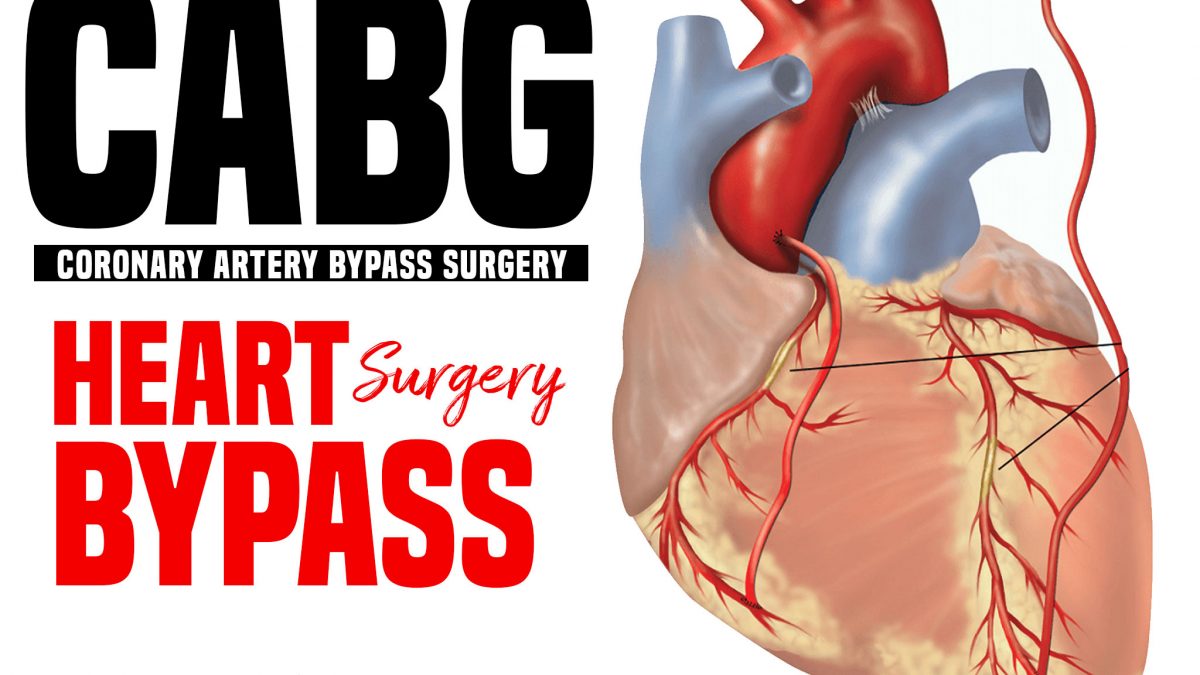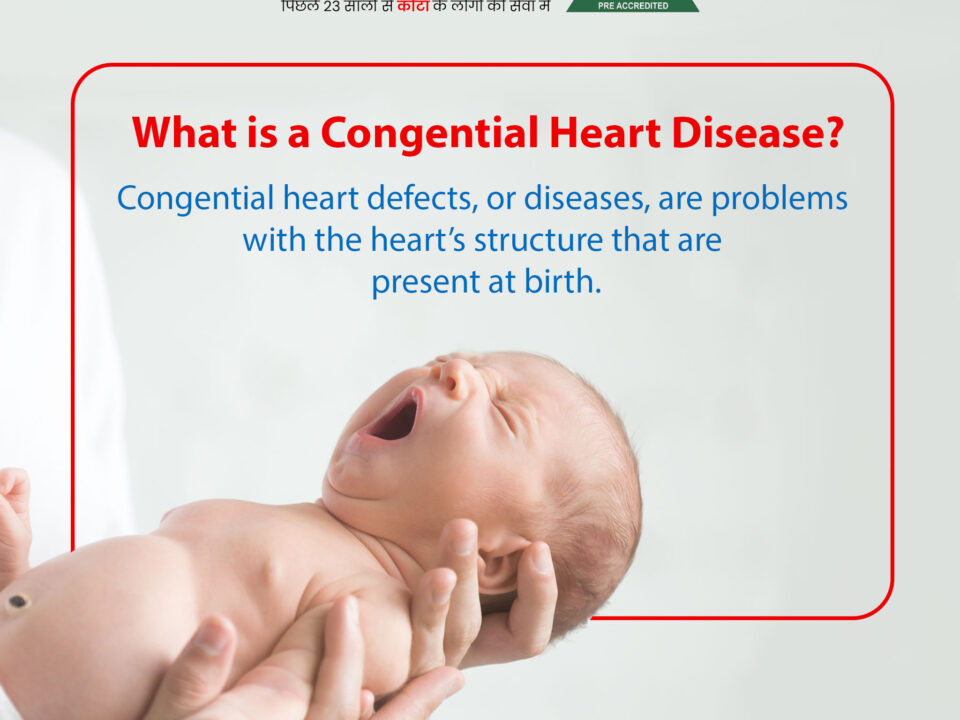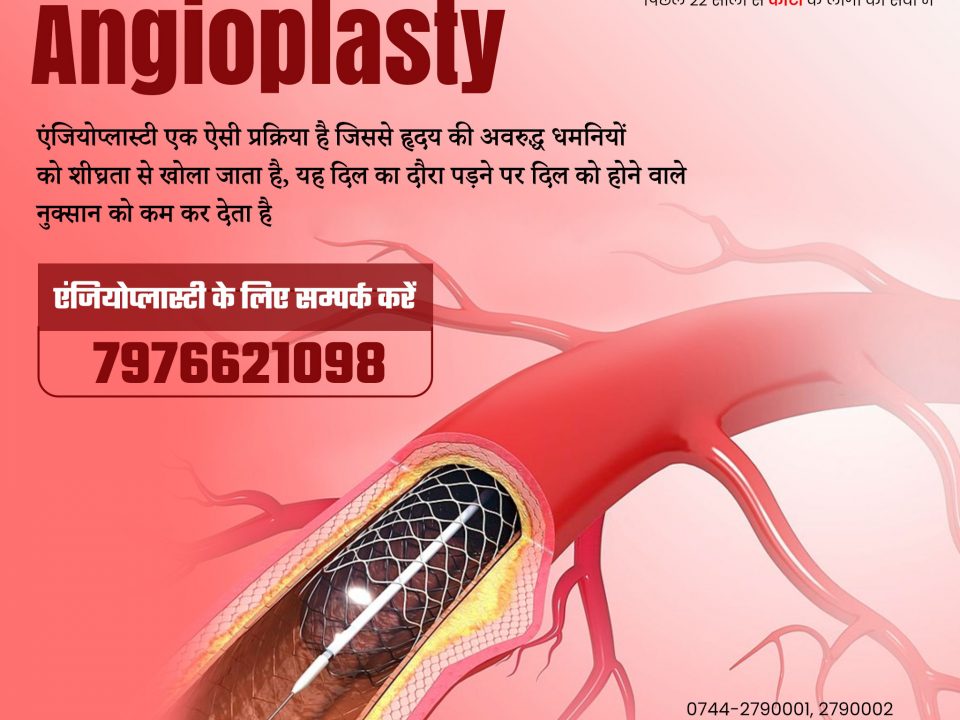- Reception Numbers
- 0744-2790001
- 0744-2790002, 0744-2790003
Coronary Artery Bypass Surgery | CABG | Heart Bypass Surgery in Kota

टेट्रालजी ऑफ़ फैलो – कारण, लक्षण और उपचार | Tetralogy of Fallot in Kota
September 19, 2022
Coarctation Of Aorta With Arch Hypoplasia
April 14, 2023- Best General Surgery Hospital in Kota
- Best Heart Hospital & Cardiology Treatment in Kota
- Cardiac Care Services in Kota
- Cardiology
- Children Heart Specialist in Kota
- Heart Hospital in Kota
- Heart Specialist in Kota
- mukhyamantri chiranjeevi yojana rajasthan
- Multi-speciality Hospital in Kota
- Paediatric Heart Surgeon in Kota
- RGHS Hospital in Kota
- RGHS Hospital in Rajasthan
- Sudha Hospital & Medical Research Centre
- Best CABG Surgery in Kota
- Best CABG Surgery in Rajasthan
- Best Cardiac Care Facility in Kota
- Best cardiac care Hospital In Kota
- Best cardiac care Medicine doctor in Kota
- Best Cardiac Care Services in Kota
- Best Cardiac Care Surgeon in Kota
- Best cardiac Hospital In Kota
- Best cardiology department in Kota
- Best Coronary Artery Bypass Surgery in Kota
- Best Coronary Artery Bypass Surgery in Rajasthan
- Best Heart Bypass Surgery in Rajasthan
- Best Heart Hospital In Kota
- Best Heart Hospital iN Rajasthan
- Best Heart Surgeons in Kota
- Best Heart surgery in Kota
- Best Hospital for heart attack Treatment in Kota
- Best Hospital for heart surgery in Kota
- Best Hospital for heart Treatments in Kota
- BestHeart Bypass Surgery in Kota
- Biggest Cardiology Facility in Kota
- cardiac angioplasty in Kota
- Cardiac arrest surgery in Kota
- Cardiac Arrest treatment in Kota
- Cardiac care hospital in Kota
- Cardiac care services by RGHS
- Cardiac care services in Kota
- Cardiac MRI
- Cardiac Surgeon
- Cardiac Surgeon Near Me
- Cardiac Surgery by RGHS
- Cashless CABG surgery in Kota
- Cashless CABG Surgery in Rajasthan
- Coronary Artery Bypass Surgery in Kota
- Coronary Artery Bypass Surgery in Rajasthan
- CT Angiography of Heart
- Difference between Heart Attack & Cardiac Arrest
- Dr. Palkesh Agarwal Best Heart Surgeon in KOta
- Free CABG surgery in Kota
- Free Coronary Bypass Surgery in Kota
- Free Heart Bypass Surgery in Kota
- Heart attack operation in Kota
- Heart Bypass Surgery in Kota
- Heart Bypass Surgery Price in Rajasthan
- Heart Bypass Surgery Price in Sudha Hospital & Medical Research Centre
- Heart care services in Kota
- Heart Hospital Near Me
- Heart Hospitals in Kota
- heart operation by Mukhyamantri Chiranjivi Swasthya Bima Yojna in Rajasthan
- heart operation by Mukhyamantri Chiranjivi Swasthya Bima Yojna ki Kota
- Heart Operation by RGHS in Kota
- Heart Operation by RGHS in Rajasthan
- Heart specialist in Kota
- Heart Surgeons in Kota
- Heart Surgery by RGHS
- Mini Heart attack care in Kota
- Mini Heart attack operation in Kota
- Most Advanced Heart Hospital in Kota
- Most successful Heart Surgeries in Kota
- What is cardiac arrest?
- What is heart attack?
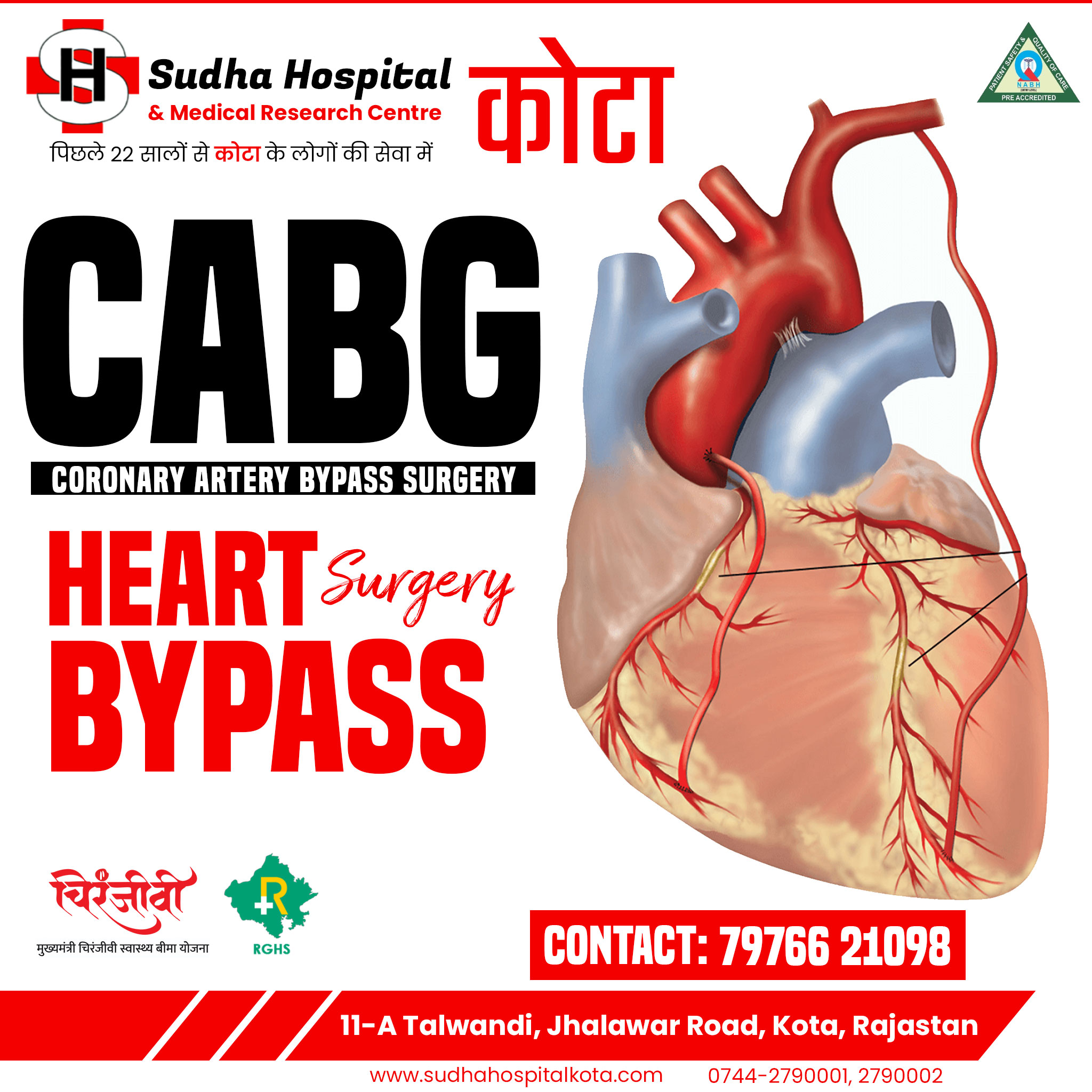
Heart bypass Surgery in Kota
Coronary artery bypass surgery - CABG (commonly called ‘Bypass surgery’) is done to bypass the blockages in the heart arteries. Like other organs in the body, the heart also needs uninterrupted blood supply. This is supplied by the left and right coronary arteries. When these arteries become narrowed by deposition of fat – rich material on the inside (atherosclerotic plaque), coronary heart diseases develop. The chances of developing coronary heart disease increase with age, particularly if one or more risk factors are present – overweight, diabetes , hypertension, smoking habit, high cholesterol levels, or family history. Surgery is done to abolish chest pain, improve quality of life and reduce the risk of death from the disease.
While coronary angiogram (special dye injection and filming of the heart arteries) is mandatory to diagnose coronary heart disease , ECG, ECHO, stress test add vital information.

Heart Bypass Surgery in Kota | Sudha Hospital & Medical Research Centre
Treatment Options
Coronary bypass surgery and angioplasty with stent insertion form the mainstay of treatment for patients with coronary artery blockages whose disease is amenable for the same. Those with minor disease burden, anatomy of the arteries and disease not suitable for intervention or those with severely depressed heart function may be treated with medication alone.
Broadly CABG is the preferred treatment for: –
- Disease of the left main coronary artery
- Disease of 2 or more coronary arteries
- Diabetics with more than one blocked artery
- Patients with suboptimal heart function
Decision Making
Good hospitals have a multi disciplinary team approach to decide the best treatment for the individual patient. In the back drop of ACC/AHA guidelines, the cardiologist and the cardiac surgeon discuss the angiogram, the disease, the anatomy and involve the patient and suggest the right option. The patient should realize that he should also consult the heart surgeon before finalizing on the treatment mode.
CABG Procedure
CABG is amongst the most common operations performed worldwide. It is important to quit smoking for at least 4 weeks prior to surgery, have good control of blood sugar and also stop the blood thinning medicines (clopidogrel) at least 3-5 days before surgery. It may also be important to rule out blockages in arteries of the neck and legs before the surgery. The operation is done under general anesthesia through a midline cut in the chest; the conduits used for bypass are taken out from within the chest for most patients. They may also be harvested from the hand and the legs. The long term benefit (over 10-15 years) is maximum. If the conduits are taken from within the chest, as is the procedure in our centre, the surgery may be done on a stopped heart or on the beating heart (OFF PUMP CABG) as is more common. The procedure may last upto 4 hours or more depending on the complexity of the disease, number of bypasses and additional procedures.
Once shifted to the surgical intensive care the patient is maintained on ventilator to assist breathing for the first 3-4 hours, supported with analgesia and sedation. He/she is mobilised the same evening or within the next 24 hours and supported with physiotherapy and breathing exercises.
MICS CABG
Minimally invasive cardiac surgery (‘key-hole’ CABG) is a CABG performed through a small incision in the left side of the chest between 2 ribs, and is usually supported by 2 tiny cuts below the main incision. The left coronary artery blockages may be bypassed generally through this technique provided the anatomy is suitable and the conditin is not too bad. Advantages include avoidance of midline split in the breast bone, less pain, less bleeding, less hospital stay, early recovery, and good cosmetic results.
What to expect after surgery – CABG?
Early recovery: The patient would be in the ICU for 1-2 days while his heart rate, blood pressure, and oxygen levels are continuously monitored. He will have a couple of chest drains to drain the fluid accumulating near the heart and lungs during the first 24-48 hours. He will have intravenous lines in the arm/neck from which he receives medicines to regulate the blood pressure, a bladder tube to drain urine, and oxygen therapy through a mask.
The patient will have wound dressings on the chest and the leg/forearm. After 1 or 2 days he may be shifted to the high dependency unit or the ward and will be discharged in 4-6 days.
Recovery at home
- Have reduced appetite – it will take days to few weeks for taste and appetite to return.
- Insomnia – difficulty in falling asleep or experiencing improper sleep – this will improve. A pain pill or sleeping pill at the bed time for few days can help.
- Be constipated – laxative, fruits and fibres will help.
- Have swelling – if you have leg incision. Elevation of the limb and elastocrepe bandage will help. Wear leg stockings (Crepe or elastic stockings) for at least 2 weeks.
- This reduces the swelling. Remove at bedtime, wash the stockings with mild soap and water, and dry them over a line.
- Swelling at the top of chest incision – will disappear with time.
- Numbness in the chest on side of the incision or itching over the incision – normal, will disappear with time.
- Muscle pain/discomfort over the shoulder, upper back – will better with time. Pain medicines will help.
- Generalized body ache and pain over incisions are common. Pain medicines can be taken at regular intervals for 10-5 days. No prizes for avoiding pain pills during this period.
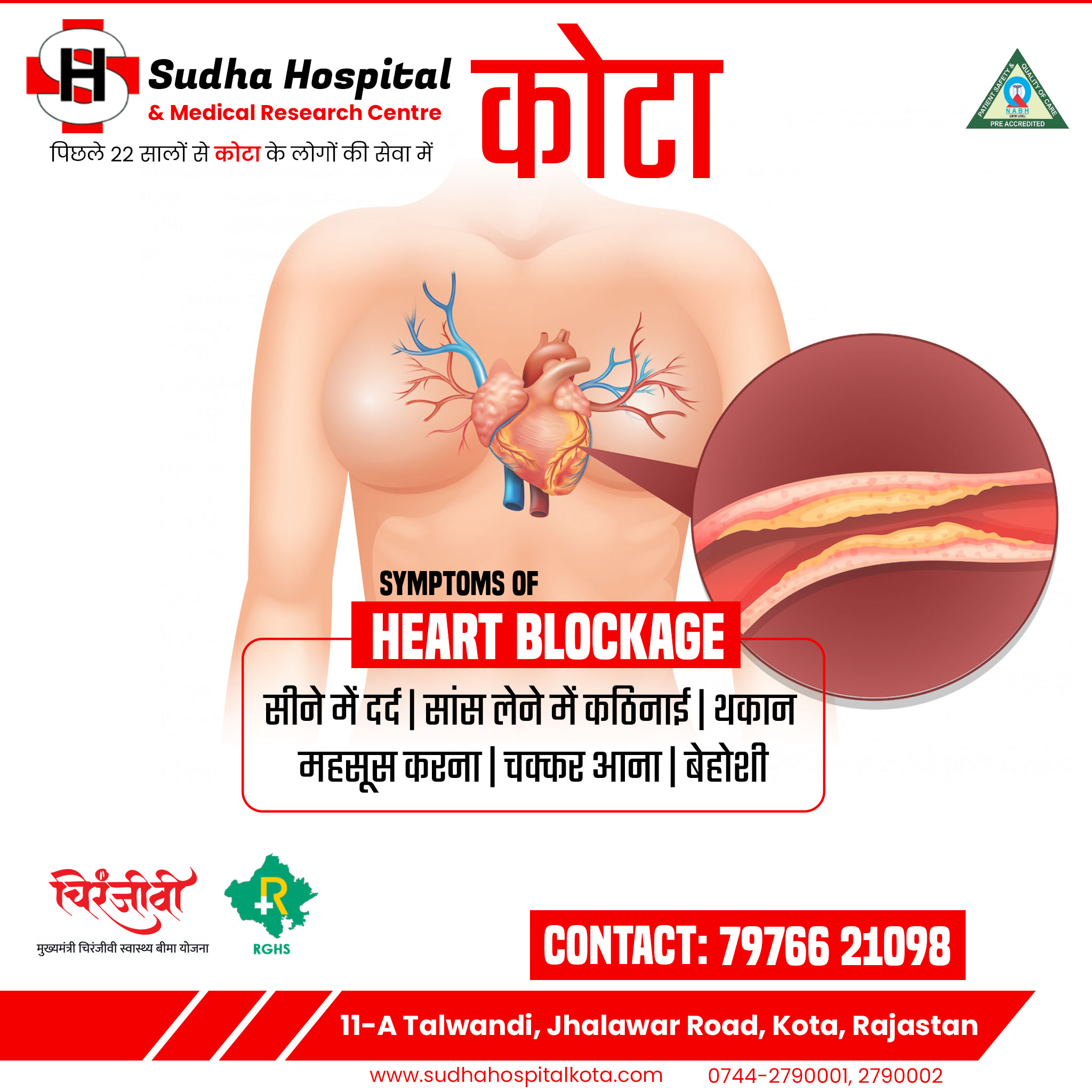
Care of the incision – Chest
- Bathe with mild soap and warm water.
- Avoid scrubbing over the wound dressing.
- Avoid ointments, oils, lotions, powder over the incision.
- Contact your surgeon for drainage of fluid from the incision, persistent fever, pain, redness, or swelling.
Medicines
Take medicines as advised for control of blood pressure, diabetes, and cholesterol lowering. These medicines apart from the obvious actions, also aid in reversing the effects of the disease on the heart.
Symptoms needing urgent attention
- Heart rate more than 120 and shortness of breath.
- Sudden numbness/weakness in arm/leg
- Severe abdominal pain
- Chills/fever
- Extreme fatigue
- Persistent oozing/bleeding from incision
Activity
- Stop any activity if short of breath, have irregular heart beat or have chest pain – rest for 20 minutes.
- Rest – Balance rest and exercise. Take short naps.
- Dress – Comfortable loose fitting clothes.
- Walking – Gradual increase of activities at your own pace.
- Stairs – Climb at slow pace. Use legs to climb, do not pull yourself up with arms when using handrail.
- Sexual – Resume activity when comfortable, about 4-5 weeks’ time.
- Driving – You can ride in a car as a passenger. After 6 weeks you can ride a two – wheeler or drive a car. It takes about 6 weeks for the breast bone (sternum) to heal.
- Lifting – Avoid lifting more than 3-5 kg of weight for 6 weeks, this includes carrying children, bags, moving furniture etc.
- Work – Light work can be resumed 6 weeks after surgery. Heavy work, cycling, sports, swimming, heavy house work can be resumed after about 3 months – confirm with your surgeon.
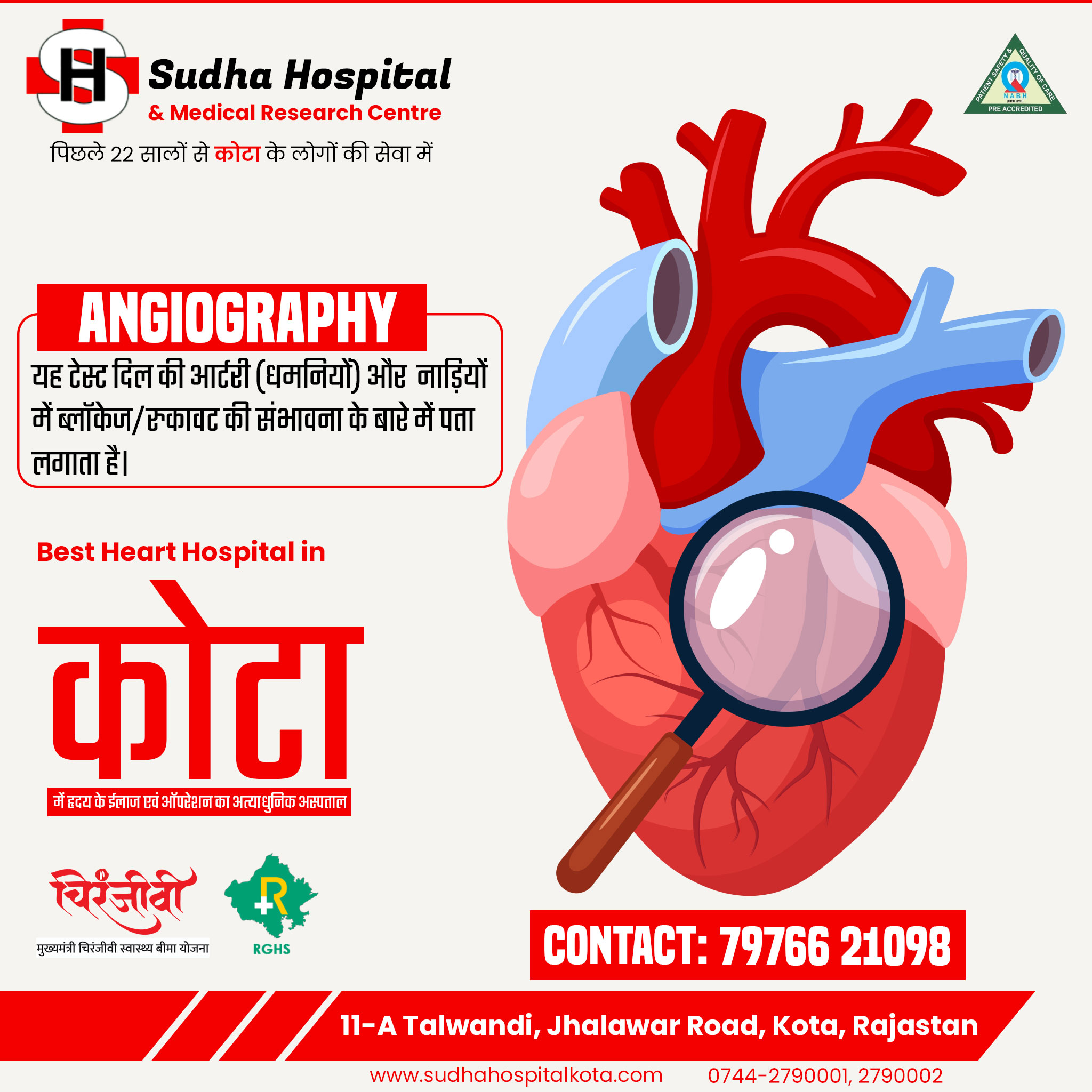
Which hospital si the best Heart Hospital for Coronary Bypass Surgery in Kota?
Sudha Hospital & Medical Research Centre is the best hospital for Coronary Bypass Surgery in Kota. Sudha Hospital has 3 highly experienced Heart Surgeons in kota under one roof. Sudha Hospital has dedicated Cathlab, Advanced ICU and state of the art technology for all heart treatments. Sudha Hospital is one of the leading Heart Hospital in Kota. Sudha Hospital is offering best heart treatment at affordable prices in Kota. Dr. Palkesh Agarwal is the first choice of patients when they have to make a selection of heart surgeon in Kota for Heart Bypass Surgery. Success rate of Heart bypass surgery is excellent at Sudha Hospital. Technicians, OT Staff and all other nursing staff of our Cardiology department at Sudha Hospital is very professional, highly experienced and well behaved. Patient care is our first and last goal at Sudha Hospital Cardiac Care Department. Moreover Sudha Hospital is a cashless Hospital, it is empanelled with all major Health insurances companied and TPAs, if you have any type of health insurance you may take advantage of our world class heart care services at Sudha Hospital & Medical Research Centre Kota. Sudha Hospital is empanelled with Mukhyamantree Chiranjivi Swasthya Bima Yojna and RGHS which further will help you to under go a free of cost Heart bypass Surgery in Kota, If you have anyone of these cards you may get free heart bypass surgery in Kota at Sudha Hospital & Research Centre. So if you are looking for a Heart Bypass surgery in Kota give us a chance to serve you and treat you. Sudha Hospital has in-house Blood Bank for all emergency blood needs require during the surgery.
What is Coronary Artery Bypass Surgery cost in Kota?
Answer: Coronary Artery Bypass Surgery in Kota will cost you in a price range of 1.5Lakh to 2.5Lakh rupees anywhere in Kota. However at Sudha Hospital & Medical Research Centre you may get a fre Coronary Artery Bypass Surgery in Kota by using Mukhyamantree Chirnajivi Swasthya Beema Yojna Benefits or If you are a Rajasthan Government employee, you just have to produce your RGHS card at Sudha hospital, by doing so you will get world class heart treatment for free in Sudha Hospital.

